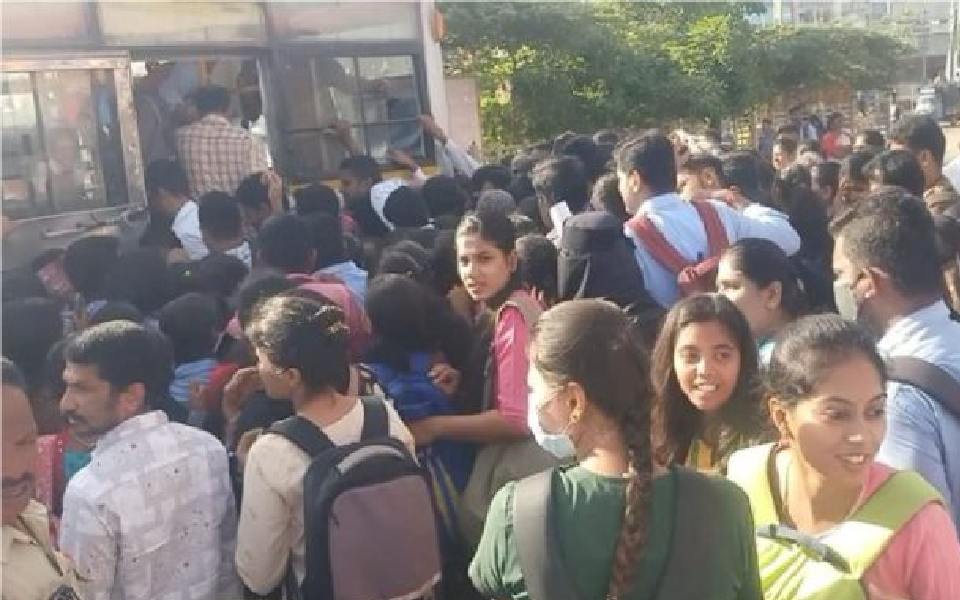Bengaluru: One of the newly formed Congress government’s flagship schemes, the ‘Shakthi’ Yojana which came into effect earlier this week, has shown a very positive response. In the meantime, alongside people complaining about the crowding, reports also indicate that the ridership of men travelling in the state transport has also shown a steep surge.
Quoting notes of a number of urban mobility experts, The New Indian Express reported that there has been a sharp rise in the overall ridership of passengers including men who have to pay for their travel.
As per experts cited by the TNIE, they opined that there could be a possibility of two kinds of shifts following the launch of the Shakthi scheme. Firstly, the women who previously preferred other modes of transport, veered to the state transport. Subsequently after the implementation of the scheme there was a substantial surge in ridership in the form of euphoria towards the complimentary initiative.
ALSO READ: Kalaburagi head constable's murder case, accused shot in leg while attempting to escape
According to the TNIE report, the average daily ridership of BMTC stands at 27.34 lakh. However, data provided by the transport utility reveals that on June 12, the total ridership reached 34.94 lakh, with 17.57 lakh women passengers. On June 13, the ridership increased further to 40.17 lakh, including 20.57 lakh women. Similarly, on June 14, the total ridership was 33.44 lakh, with 16.85 lakh passengers being women, and on June 15, it reached 33.28 lakh, with 17.67 lakh women passengers. These figures indicate a rise in the number of male passengers.
Meanwhile, in a video released by a Twitter user named @shaandelhite , a KSRTC conductor was seen stating that “Because women are going out with family and so more men are travelling by bus. Earlier, it was 7-8k collections per day but now it is up to 16k per day,” he added.
Let the Truth be known. If you read VB and like VB, please be a VB Supporter and Help us deliver the Truth to one and all.
Panaji (PTI): As part of a crackdown against tourist establishments violating laws and safety norms in the aftermath of the Arpora fire tragedy, Goa authorities on Saturday sealed a renowned club at Vagator and revoked the fire department NOC of another club.
Cafe CO2 Goa, located on a cliff overlooking the Arabian Sea at Vagator beach in North Goa, was sealed. The move came two days after Goya Club, also in Vagator, was shut down for alleged violations of rules.
Elsewhere, campaigning for local body polls, AAP leader Arvind Kejriwal said the fire incident at Birch by Romeo Lane nightclub at Arpora, which claimed 25 lives on December 6, happened because the BJP government in the state was corrupt.
An inspection of Cafe CO2 Goa by a state government-appointed team revealed that the establishment, with a seating capacity of 250, did not possess a no-objection certificate (NOC) of the Fire and Emergency Services Department. The club, which sits atop Ozrant Cliff, also did not have structural stability, the team found.
The Fire and Emergency Services on Saturday also revoked the NOC issued to Diaz Pool Club and Bar at Anjuna as the fire extinguishers installed in the establishment were found to be inadequate, said divisional fire officer Shripad Gawas.
A notice was issued to Nitin Wadhwa, the partner of the club, he said in the order.
Campaigning at Chimbel village near Panaji in support of his party's Zilla Panchayat election candidate, Aam Aadmi Party leader Kejriwal said the nightclub fire at Arpora happened because of the "corruption of the Pramod Sawant-led state government."
"Why this fire incident happened? I read in the newspapers that the nightclub had no occupancy certificate, no building licence, no excise licence, no construction licence or trade licence. The entire club was illegal but still it was going on," he said.
"How could it go on? Couldn't Pramod Sawant or anyone else see it? I was told that hafta (bribe) was being paid," the former Delhi chief minister said.
A person can not work without bribing officials in the coastal state, Kejriwal said, alleging that officers, MLAs and even ministers are accepting bribes.





